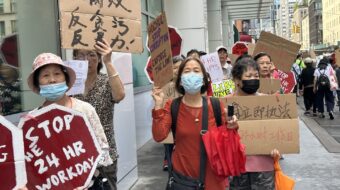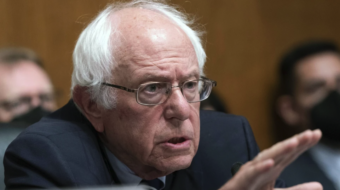Leaders of America’s major unions, coming out of intense negotiations with the president and congressional leaders, said late yesterday that they were close to winning big improvements for workers in the health care reform legislation nearing completion in the Congress.
At a hastily called press conference with leaders of AFL-CIO unions, Change to Win unions and the National Education Association, AFL-CIO President Richard Trumka said the final health care bill is almost certain to emerge is a “milestone.”
He noted, however, that “labor doesn’t look at this as the end of the fight,” but another step in the quest for real reform.
“We’ve been fighting for health care for over 60 years,” he declared, “and we are on the threshold of a significant achievement.”
What started out as a planned Monday meeting at the White House by union leaders and the president ended up as two days of hard negotiating resulting in what the union leaders call major changes in favor of workers in the excise tax the Senate bill places on high-cost health care plans.
The deal raises the threshold at which family plans are taxed from $23,000 to $24,000 in 2013 for families, with annual increases in the threshold tied to the Consumer Price index plus one. The threshold for single plans will be $8,900.
The agreement calls for further raising of the threshold if health care costs grow faster than expected from 2010-2013.
Also included is a “defacto” raise of the threshold by as much as $2,000 in 2015 when dental and vision costs will be exempted.
For plans that have significant numbers of women and/or older workers the threshold will be set at a higher, though unspecified rate.
Another feature of the deal is to preserve the original Senate proposal to raise the threshold for plans with workers in high-risk professions, affecting more than 9 million workers.
The plan provides for temporary raise of the threshold in high-cost states, calculated to help more than 38 million workers and for unspecified “transitional relief” for employers and workers to adjust to the tax.
Insurance plans that are part of collective bargaining agreements will, beginning in 2017, be able to enter the insurance exchange. The Senate bill, as it exists now, does not allow this option.
Very important to the unions is the part of the compromise that provides a five-year “transition window” for state and local employee plans and plans negotiated through collective bargaining agreements before they are subject to the tax.
Some at the press conference tried to minimize the importance of the agreements, particularly the last one, with a reporter asking how valuable it would be for a worker to avoid paying the tax now, only to have to pay it several years from now.
“If we do nothing to reform health insurance now no-one will be able to afford any kind of health insurance a few years down the road,” Trumka shot back. “If we had our way this would not be the final bill we would have written but we have some important reforms here and doing nothing is not an option.”
Van Roekel noted that “the progress we’ve made bolsters our belief that a nation as great as America can provide health care reform without penalizing our working families in the process.”
The compromise still leaves issues the unions have said are important in an unresolved status. Among them are guarantees that employers take responsibility for paying a fair share of health care costs.
When asked about this, Trumka said, “We’ve seen tremendous progress over the last couple of days. President Obama deserves credit for being the kind of president willing to take this on. But we are continuing the fight to increase our priorities in the health care reform bill.”

MOST POPULAR TODAY


Zionist organizations leading campaign to stop ceasefire resolutions in D.C. area

High Court essentially bans demonstrations, freedom of assembly in Deep South

Afghanistan’s socialist years: The promising future killed off by U.S. imperialism

Communist Karol Cariola elected president of Chile’s legislature






Comments